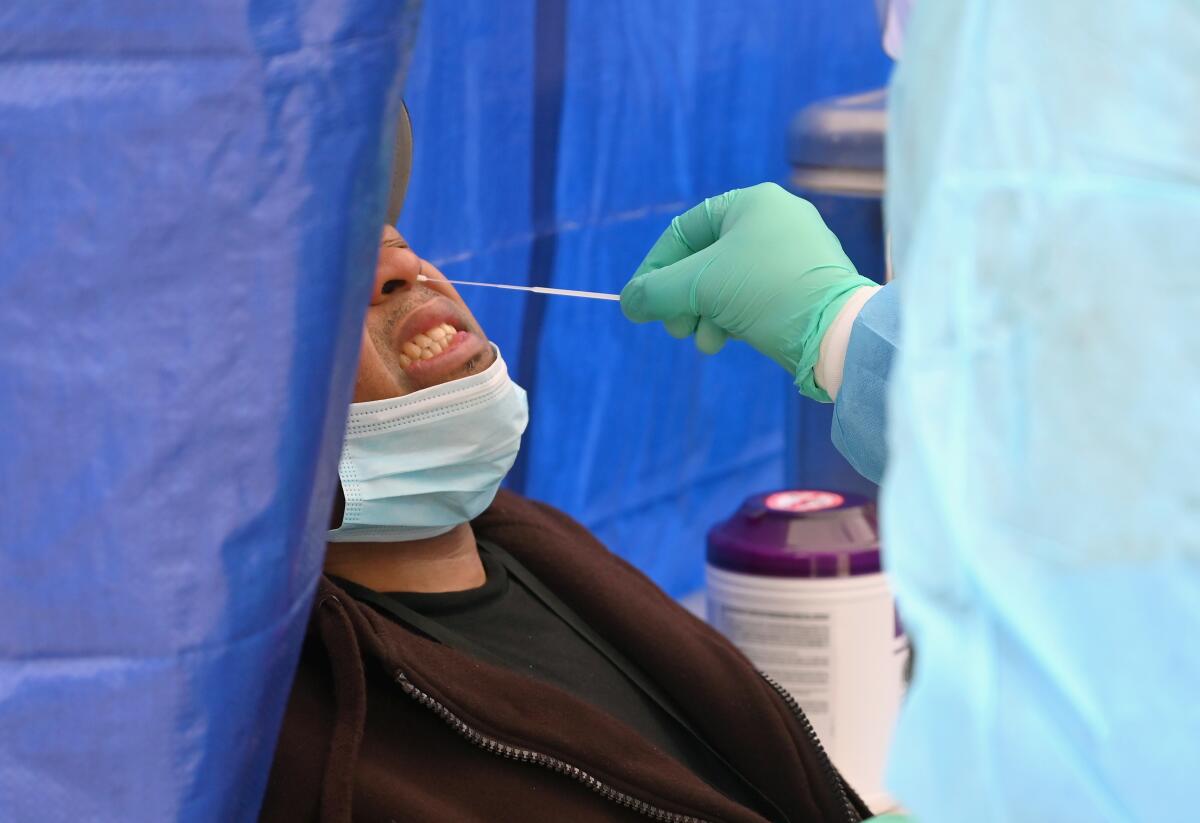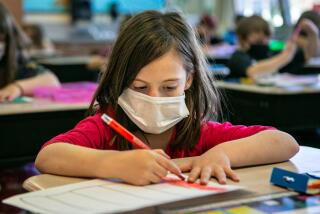‘Every parent’s nightmare’: A child’s death brings new coronavirus fears as more states reopen

- Share via
A 5-year-old boy in New York died from a condition believed linked to COVID-19, and the state’s health officials are investigating several similar cases, New York Gov. Andrew Cuomo said Friday.
“This is every parent’s nightmare,” Cuomo said.
“While rare, we’re seeing some cases where children affected with the COVID virus can become ill with symptoms similar to the Kawasaki disease or toxic shock-like syndrome that literally causes inflammation in their blood vessels,” the governor said during his daily briefing. “This would be really painful news and would open up an entirely different chapter because I can’t tell you how many people I spoke to who took peace and solace in the fact that children were not getting infected.”
Physicians in Los Angeles and the United Kingdom have seen similar links.
Cuomo urged people to immediately seek medical care if their child showed symptoms such as a fever lasting five or more days, difficulty eating or drinking, severe abdominal pain, diarrhea, vomiting, change in skin color, a racing heart or decreased urination.
The news about the potential pediatric complications comes as many states are at least partially reopening their economies — despite many not reaching milestones that experts and the Trump administration have suggested — in a bid to ward off more financial pain.
On Friday, new employment figures revealed the devastating toll the pandemic has taken on the nation’s economy. About 20.5 million jobs were lost in April amid a near nationwide shutdown to respond to the virus, and unemployment soared to 14.7%, the highest level since the Great Depression. These numbers are expected to grow in coming weeks.
Democrats seized upon these numbers to argue for another round of stimulus relief. Sens. Kamala Harris of California, Bernie Sanders of Vermont and Ed Markey of Massachusetts introduced a bill to provide $2,000 per month to people who make less than $120,000 annually until three months after the pandemic is over.
“The coronavirus pandemic has caused millions to struggle to pay the bills or feed their families,” Harris said in a statement. “… Bills will continue to come in every single month during the pandemic and so should help from government.”
Although previous economic relief was approved on a bipartisan basis, the new effort is likely to face push back from Republicans, who have prioritized scrutinizing how past relief was spent.
Meanwhile, the death toll from COVID-19 in the United States grew to more than 77,100, according to Johns Hopkins University.
Researchers warned that the pandemic could lead to an additional 75,000 “deaths of despair” related to drugs, alcohol and suicide unless lawmakers move quickly to boost employment and provide access to mental health services, according to a report released by the Well Being Trust and the Robert Graham Center for Policy Studies in Family Medicine and Primary Care.
“If the country continues to ignore the collateral damage — specifically our nation’s mental health — we will not come out of this stronger,” Benjamin F. Miller, chief strategy officer at the Oakland-based trust, said in a statement.
Lawmakers have struggled to balance public health and economic needs as they debate how to reopen the economy. More than 40 states have taken steps to reopen their economies, including California, starting on Friday. But the approaches vary widely among the states, and among counties and cities.
On Friday, Florida Gov. Ron DeSantis announced that barbershops and salons would be allowed to reopen in most of the state on Monday, except in hard-hit Broward and Miami-Dade counties. Mississippi Gov. Tate Reeves also announced that hair-care establishments as well as gyms would be allowed to reopen Monday.
Michigan Gov. Gretchen Whitmer on Thursday extended her state’s stay-at-home order two weeks until May 28. But she also allowed the reopening of manufacturing plants, including automakers, next week. Several summer camps, including those run by the Boy Scouts, announced they would not open for the summer.
President Trump, who has been pushing for faster reopenings despite his coronavirus task force’s guidelines, singled out California and its governor as he argued some states were moving too slowly.
“I’ve looked at a couple of states that are being absolutely ridiculous. But ultimately, the people are forcing it,” Trump said Friday on Fox News. “I see what’s going on and Gavin Newsom’s been very generous to me in his statements and I appreciate it, but I think they can move a little quicker in California, to be honest.”
Polling has indicated that the vast majority of Americans prefer that the government prioritize public health over the economy, but there continue to be protests and shows of support among those who believe the government overreached in ordering people to stay at home and businesses to close.
In Pennsylvania, Gov. Tom Wolf has lifted stay-at-home orders in 24 counties in the northwestern and north-central parts of the state, and on Friday, he announced the easing of restrictions in 13 counties in the western part of the state. But he also extended closures in the Philadelphia region through June 4. Protesters circled Philadelphia’s City Hall, mostly in their cars, on Friday, and counterprotesters came out to block their paths.
In Dallas, where salon owner Shelley Luther was briefly jailed for opening against state orders, Texas Sen. Ted Cruz showed up to get his hair cut and to make a point.
Luther was sentenced to seven days in jail for contempt and fined $7,000 for defying orders to keep her business closed. She was arrested Wednesday and released Thursday after an outcry from conservatives. The state Supreme Court ordered her release after Gov. Greg Abbott changed his executive order and eliminated jail time for people defying restrictions.
“I’m proud to stand with Shelly Luther. What happened to her was wrong,” Cruz told reporters after visiting Salon a la Mode. “It was ridiculous to see someone sentenced to seven days in jail for cutting hair. That’s not right, that’s not justice and that’s not Texas.”
Salons had been ordered to remain closed in the state while restaurants, movie theaters and malls were reopened with limited occupancy. But on Friday, under orders from Abbott, salons and barbershops were allowed to take customers under some restrictions. More than 1,000 people have died from COVID-19 in Texas, according to Johns Hopkins.
More to Read
Sign up for Essential California
The most important California stories and recommendations in your inbox every morning.
You may occasionally receive promotional content from the Los Angeles Times.











